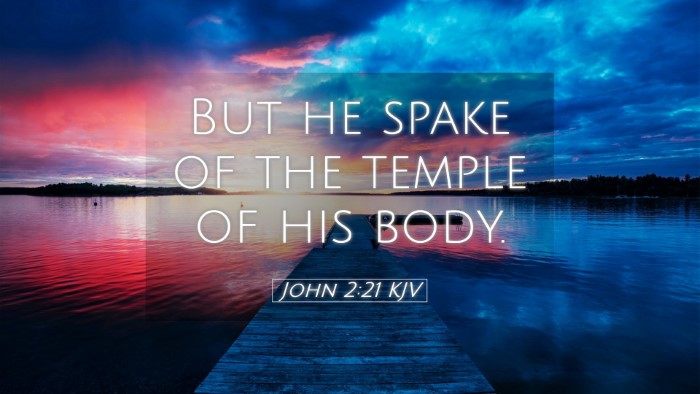Old Testament
Genesis Exodus Leviticus Numbers Deuteronomy Joshua Judges Ruth 1 Samuel 2 Samuel 1 Kings 2 Kings 1 Chronicles 2 Chronicles Ezra Nehemiah Esther Job Psalms Proverbs Ecclesiastes Song of Solomon Isaiah Jeremiah Lamentations Ezekiel Daniel Hosea Joel Amos Obadiah Jonah Micah Nahum Habakkuk Zephaniah Haggai Zechariah MalachiJohn 2:21
John 2:21 KJV
But he spake of the temple of his body.
John 2:21 Bible Commentary
Commentary on John 2:21
Verse: "But he spake of the temple of his body." - John 2:21
This verse is pivotal in understanding Jesus’ identity and mission, encapsulated in His metaphor of the temple. To appreciate its significance, we must delve into various theological insights offered by esteemed commentators from the public domain.
Contextual Background
In this portion of the Gospel, Jesus has just performed the miraculous act of cleansing the temple, driving out merchants and money-changers. His authority is challenged by the religious leaders, who demand a sign for this audacious act. Jesus responds with a cryptic yet profound statement that alludes to His resurrection.
Insights from Matthew Henry
Matthew Henry emphasizes that the "temple of his body" signifies the incarnational aspect of Christ—that is, the divine Son dwelling among humanity. He interprets the cleansing of the temple as a foreshadowing of the need for inner purity versus outer ritualism.
- Spiritual Implications: Henry suggests that Jesus establishes Himself as the true temple, where genuine worship must take place, transcending physical location.
- Resurrection Reflections: He points out that this statement hints at the resurrection, wherein Jesus asserts that He will rebuild His body (the temple) after its destruction, signifying the new covenant relationship between God and His people.
Reflections from Albert Barnes
Albert Barnes provides a detailed exegesis on this passage, where he articulates that Jesus speaks metaphorically. He contrasts the Jewish temple, which was a mere structure, with Jesus being the living temple.
- Contrast with the Physical Temple: Barnes explains that the temple in Jerusalem, while sacred, was destined to be destroyed; conversely, Christ's body represents a permanent means of access to God.
- The Role of the Body: He elaborates that Jesus’ use of the term ‘body’ is multifaceted: it denotes His physical existence and the sacredness of His mission to reconcile humanity with God.
Thoughts by Adam Clarke
Adam Clarke's commentary focuses on the revelatory nature of Christ's statement. He notes that, although the disciples and listeners failed to grasp its full meaning at the time, it reveals vital truths about messianic expectations.
- Theological Significance: Clarke interprets this declaration as an indication of Christ as the ultimate sacrifice. Just as the temple was a place for sacrifices, Jesus' body becomes the ultimate offering for the sins of the world.
- Foreshadowing Resurrection: He highlights how this statement foreshadows not just the resurrection but a shift from the old covenant to the new. The physical temple is no longer the focal point of worship; rather, it is in Christ that believers find spiritual communion with God.
Theological Application
Theologically, John 2:21 invites believers to contemplate the implications of Christ's incarnation and resurrection. The verse asks the church to recognize that their relationship with God is now accessibly personal through Jesus, who is both the means and the mediator.
Moreover, this passage challenges contemporary Christians to evaluate what constitutes their “temple” and how they honor God in their lives. Just as the physical temple represented God’s presence, believers are called to embody that presence today.
Conclusion
In John 2:21, the profound declaration of Jesus regarding the temple of His body encapsulates the essence of His mission—transitioning from a physical place of worship to a vibrant, personal relationship with God through Christ. Commentators like Henry, Barnes, and Clarke provide essential insights that deepen our understanding of the scripture, enriching the spiritual lives of pastors, students, theologians, and scholars.
This insight demonstrates the need to engage with Scripture beyond mere historical analysis—emphasizing relational theology that calls believers to live transformed lives in light of Christ’s sacrificial offering and resurrection.


